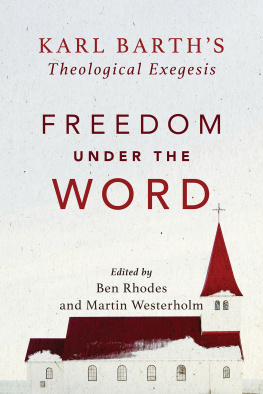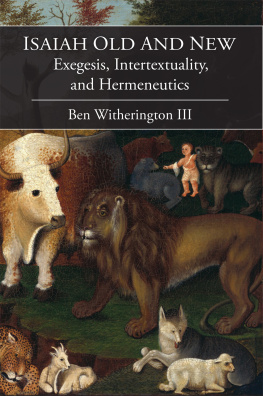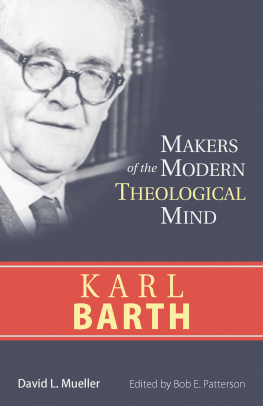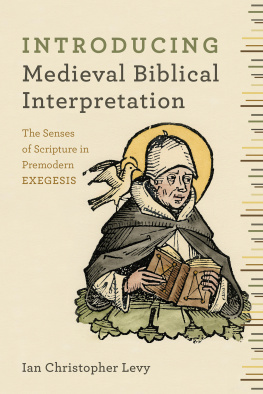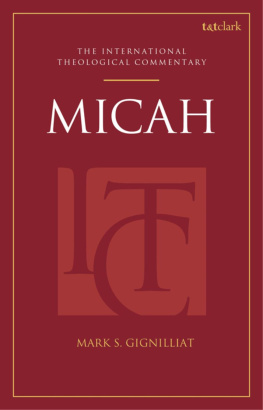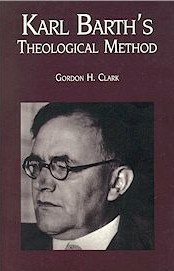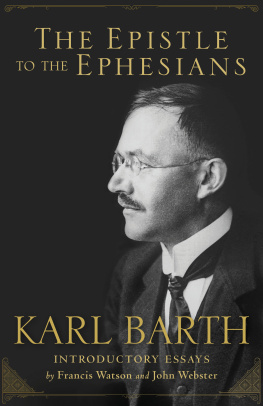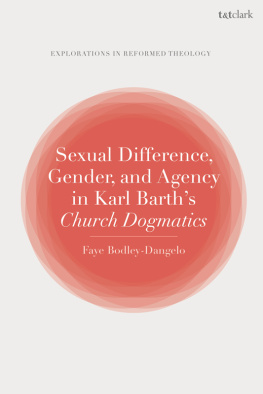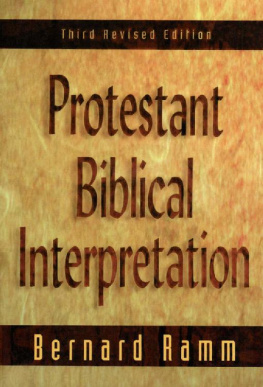Contents
Cover
Half Title Page
Title Page
Copyright Page
Dedication
Abbrevia
Introduction Ben Rhodes and Martin Westerholm
Part 1: Barths Theology of Scripture
1. Barths Theology of Scripture in Developmental Perspective Martin Westerholm
2. Barths Theology of Scripture in Dogmatic Perspective Ben Rhodes
Part 2: Barths Early Exegesis
3. Rewriting Romans: Theology and Exegesis in Barths Early Commentaries Francis Watson
4. A Relation beyond All Relations: God and Creatures in Barths Lectures on Ephesians, 192122 John Webster
5. The Call to Repentance Is the Call of the Gospel: Barth, the Epistle of James, and Moral Theology Carsten Card-Hyatt
Part 3: Barths Doctrine of God in Exegetical Perspective
6. The Logos Is Jesus Christ: Karl Barth on the Johannine Prologue Wesley Hill
7. Karl Barth on Ephesians 1:4 Stephen Fowl
8. Karl Barth and Isaiahs Figural Hope Mark Gignilliat
Part 4: Barths Doctrine of Creation in Exegetical Perspective
10. Creation and Covenant: Karl Barths Exegesis of Genesis 2:817 Andrew B. Torrance
11. Barth on Gods Graciousness toward Humanity in Genesis 12 Christina N. Larsen
12. Worthy Is the Lamb: Karl Barths Exegesis of Revelation 45 Christopher Green
Part 5: Barths Doctrine of Reconciliation in Exegetical Perspective
13. Barth on Christ and Adam Grant Macaskill
14. We, Too, Are in Advent: Barths Theological Exegesis of Hebrews 11 R. David Nelson
15. The Compassion of Jesus for the Crowds Paul T. Nimmo
Contributors
Subject Index
Scripture Index
Author Index
Back Cover
Abbreviations
| CD | Karl Barth, Church Dogmatics , 4 volumes in 13 parts, ed. and trans. G. W. Bromiley, T. F. Torrance et al. (Edinburgh: T&T Clark, 195669). |
| GA | Karl Barth Gesamtausgabe (Zurich: Theologischer Verlag Zrich, 1971). |
| I | Predigten |
| II | Akademische Werke |
| III | Vortrge und kleinere Arbeiten |
| IV | Gesprche |
| V | Briefe |
| KD | Karl Barth, Kirchliche Dogmatik , 4 volumes in 13 parts (Frankfurt am Main: Fischer-Bcherei, 193267). |
| Romans II | Karl Barth, The Epistle to the Romans , trans. Edwyn Hoskyns (Oxford: Oxford University Press, 1933). |
| Rmer I | Karl Barth, Der Rmerbrief, Erste Fassung (1919) , ed. Hermann Schmidt, GA II 16 (Zurich: Theologischer Verlag Zrich, 1985). |
| Rmer II | Karl Barth, Der Rmerbrief, Zweite Fassung (1922) , ed. C. van der Kooi and Katja Tolstaja, GA II 47 (Zurich: Theologischer Verlag Zrich, 2010). |
Introduction
Ben Rhodes and Martin Westerholm
Do we really need another book on the theology of Karl Barth? After so much commentary, is there anything left that is worth saying? It is of course not surprising that the decisive figure of twentieth-century theology continues to generate debate and discussion, but one question that we might ask ourselves in considering the future of these discussions is how far they are faithful to the criterion by which Barth himself wished to be judged. Barth claimed that his theology consisted in listening to Scripture and telling his readers what he heard; he made clear that fidelity to Scripture is the appropriate criterion for evaluating its success. Yet reception of his thought has been marked by a peculiar hesitance to engage directly with his exegesis. The first wave of responses to Barths work, concentrated on his commentaries on Romans, included extensive engagement from biblical scholars, but these figures tended to devote the bulk of their attention to Barths method. Subsequent theological scholarship has struggled to make a turn to sustained consideration of exegesis. Study of Barths work in recent decades was dominated for a time by heavily conceptualized debates that turned not on attention to the particularities and surprises of Barths exegesis but on the capacity of particular master concepts to facilitate a systematizing of the whole of Barths thought. Among the casualties of these debates was patient attention to the way that the twists and turns of Barths theology are themselves reflections of his attempt to listen to the complex voice of Scripture. A series of recent conferences on Barths exegesis, including two from which the majority of the essays in this volume originate, suggest that the focal point of attention to Barths work may be shifting, but as we near the hundred-year anniversary of Barths landmark work on Romans, scholars working in this sphere are having to play a measure of catch-up.
This book aims to engage with Barth on the terms of his preferred criterion by presenting studies of his exegetical work. There are at least a couple of reasons why this task is important. In a more narrow sense, the task is crucial to consideration of the legacy and future potential of Barths theology. The fruitfulness of Barths work today is best measured by the contributions that it makes to contemporary interpretation and presentation of Scripture. But beyond narrower questions regarding Barths legacy, attention to his exegesis is important as an element in the ongoing task of learning what it means to read Scripture well. The question of the kind of interpretation that aids the churchs proclamation is the question of theological interpretation of Scripture. Just how this interpretation is to function is among the crucial questions facing theologians and biblical scholars today. Interest in theological interpretation has grown exponentially in recent years, but it has not produced agreement either among theologians or between theologians and biblical scholars on the nature and function of this practice. Debates that expose the continued fragmentation of contemporary theology by driving confessional and disciplinary divisions to the surface continue. One resource available to contemporary thinkers as they attempt to make progress in these debates is the example of past masters. Study of the exegetical habits of leading figures in the Christian tradition is thus something of a growth industry at present. Alongside renewed interest in, say, the exegesis of Thomas Aquinas, consideration of Barths exegesis is a tool that may be deployed for the sake of advancing our understanding of theological interpretation more generally.

